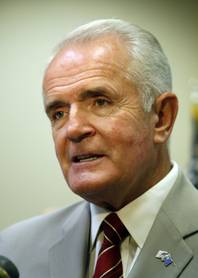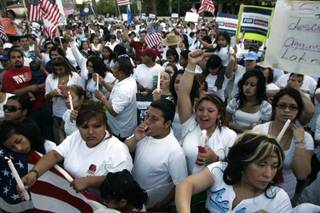Wednesday, June 23, 2010 | 2 a.m.

Gov. Jim Gibbons

Ross Miller
Sun Coverage
Sun archives
- LVCVA, Resort Association challenge immigration proposal (6-21-2010)
- ACLU, NAACP join group’s effort to block immigration petition (6-18-10)
- Nevada group seeks Arizona boycott over immigration law (5-31-2010)
- Immigration reform petition filed in Nevada (5-28-10)
- Gibbons proposes plan to open union negotiations (5-10-2010)
- Arizona boycott unlikely to benefit Vegas tourism (5-5-2010)
- Immigration rally draws 1,000 in Las Vegas (5-2-2010)
- Arizona immigration law sparks conversation in Nevada (4-30-2010)
- Protesters in Las Vegas rally against new Arizona immigration law (4-28-2010)
- Group plans Arizona boycott, criticizes new immigration law (4-26-2010)
- Arizona governor signs immigration enforcement bill (4-23-2010)
Public resources are being used to advocate one controversial ballot initiative and block another, drawing criticism about tax dollars entering politicized battles.
Gov. Jim Gibbons’ administration has drafted the Gibbons Open Government Initiative and will continue working to qualify it for the ballot. It would require local governments and unions to negotiate contracts in public, long a goal of conservatives who say public employee pay is too high.
Meanwhile, the Las Vegas Convention and Visitors Authority, a quasi-public agency funded almost entirely through room taxes, joined a lawsuit to prevent an Arizona-style illegal immigration law that has been proposed for Nevada. Arizona’s law has prompted some groups to cancel conventions there, and Southern Nevada business groups fear similar repercussions if Nevada passes similar legislation.
The actions raise questions about how far public employees and taxpayer money can wade into initiative petitions, which require supporters to get 97,000 signatures by November. Although public bodies have walked the line on initiatives that they have placed on the ballot — school district bonds or transportation projects — this process has typically been used by citizen groups to petition state government. If enough signatures are collected for both the immigration and public employee initiatives, the proposals will go to the Legislature in 2011. If the Legislature does not pass the initiatives within 40 days, they will go on the 2012 ballot.
State law says a public officer or employee “shall not request or otherwise cause a governmental entity to incur an expense or make an expenditure to support or oppose” a ballot question.
But the Gibbons administration and the authority both say Supreme Court rulings put them in the clear.
Gibbons Deputy Chief of Staff Stacy Woodbury said this week that staff has worked on the ballot initiative and drawn up instructions for signature gatherers. She said staff plans to hand off the process to a private volunteer committee soon, and that group hopes to hire professional signature gatherers through private donations.
“Frankly, these days we (the governor’s staff) don’t have a lot of resources and we have other things to do,” she said.
She added that other than staff time, no state money has been spent on the proposed initiative.
Secretary of State Ross Miller, Nevada’s top election official, cautioned that Gibbons could advocate for the matter only in a private capacity.
“It’s clear that the governor can only run his initiative petition as a private individual,” Miller said. “He can’t use resources of his office or other state employees to organize or collect signatures. If the governor were allowed to run the initiative with all the power and resources of the state, he could direct tomorrow, through executive order, all state employees must circulate the petition.”
Woodbury disagreed. “This is a policy initiative of the governor’s,” she said, comparing it to a proposed bill that staff drafts and advocates on behalf of the state’s top elected official.
Gibbons announced the initiative effort in May with a state-issued news release. In his Capitol office, flanked by Woodbury and his other deputy chief of staff, Lynn Hettrick, Gibbons was asked by a reporter if he was advocating this in his official capacity or as a private citizen. Gibbons said he was doing it as a private citizen.
On the immigration issue, Rossi Ralenkotter, president and CEO of the convention and visitors authority, compared the group’s legal challenge to lobbying in support of federal legislation that would benefit the tourism industry.
“We’re doing this purely for economic reasons,” he said. “This is about protecting jobs.” He said Arizona has lost $90 million in hotel and convention business because of a boycott of the state after the bill was signed into law.
The Arizona law requires immigrants to carry registration papers and requires police to question anyone they stop and have reasonable cause to believe is in the United States illegally.

Chad Christensen
Under a 2008 Nevada Supreme Court ruling, Ralenkotter said, public agencies can file legal challenges to proposed ballot measures. The authority, along with the Nevada Resort Association, filed a brief Monday that said the Nevada Immigration Verification Act violates Nevada’s rule that ballot measures stick to a single subject. He said the authority would be barred from running any advertisement or campaigning on the issue. An authority spokesman said the agency is using in-house lawyers and an outside attorney being paid $4,000.
Assemblyman Chad Christensen, who filed the proposed initiative, criticized the authority’s involvement. “All we’re talking about is upholding the law,” he said of his initiative. “If someone opposes that with public money, there’s a serious inequity there and a misuse of public money.”


Join the Discussion:
Check this out for a full explanation of our conversion to the LiveFyre commenting system and instructions on how to sign up for an account.
Full comments policy